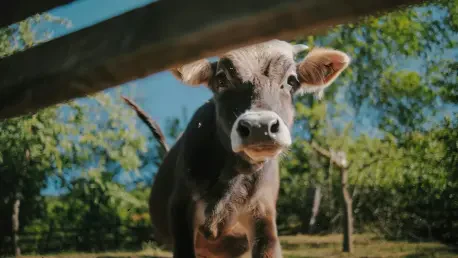As American agriculture tackles increasing challenges like labor shortages and chemical dependency, a new wave of innovation is cultivating hope in the form of AI robots. Emerging from this wave is Aigen, a startup seeking to transform farming with its cutting-edge technology. By providing an eco-friendly alternative to traditional practices, Aigen addresses pressing issues that impact growers nationwide. This narrative dives deep into how Aigen, with its groundbreaking Element robot, exemplifies a shift toward more sustainable farming practices, highlighting the intersection of advanced technology and agriculture.
Historical Context
The narrative of agriculture in the United States has long been marked by reliance on manual labor and chemical interventions, especially with the rise of industrial farming techniques in the 20th century. However, these methods have led to various challenges such as environmental degradation, health concerns associated with pesticide use, and a growing resistance of weeds to chemical herbicides. Enter Aigen, a beacon of innovation at the juncture of this longstanding history. Founded in the early 2020s, the organization has engineered practical solutions in the form of autonomous robots that introduce a technologically advanced approach to sustainable agriculture.
Aigen’s very conception stemmed from recognizing unmet needs within the agricultural sector, positioning itself as an entity at the forefront of this transformative era. By embracing both AI and solar technology, Aigen offers revolutionary means to address the inefficiencies and environmental costs associated with conventional farming techniques. Such efforts not only underscore the importance of innovation in agriculture but also demonstrate the adaptability required to meet modern challenges.
Key Innovations and Contributions
Among the numerous contributions Aigen has made, two standout innovations serve as pillars of their successful integration into sustainable farming.
Achievement or Feature 1
Central to Aigen’s success is the Element robot, a marvel of engineering built for autonomous, efficient weeding. This solar-powered apparatus employs AI to navigate crop fields, skillfully differentiating between crops and weeds—a task traditionally reliant on human intervention. By taking on this arduous role, the Element robot offers a substantial reduction in the use of harmful chemicals, contributing to both healthier food production and an enriching environment.
Achievement or Feature 2
In addition to its technological prowess, Aigen has strategically achieved acceptance within conservative farming communities. Regardless of differing views on climate issues, there is universal agreement on the need for productive, sustainable land management. By emphasizing economic efficiency through reduced labor costs and energy usage, Aigen appeals to the pragmatism inherent in such communities, fostering broader adoption of its environmentally conscious technology.
Distinguishing Factors
Aigen’s commitment to sustainable farming practices sets it apart in the crowded landscape of agricultural technology. The distinguishing aspect of its innovation lies in its dual focus on environmental stewardship and economic feasibility. Solar power replaces diesel, minimizing carbon footprints and facilitating greener agriculture. The ability to perform laborious tasks autonomously without human intervention allows Aigen to address two major farming challenges: labor shortages and chemical reliance. These characteristics solidify Aigen’s role as a pioneering force in the sustainable farming revolution.
Current Developments
Today, Aigen stands as a significant influencer within the agricultural sector, entrenching its technology across various crop fields, including tomatoes, cotton, and sugar beets. Such trials have further demonstrated the efficacy and safety of Aigen’s robots, affirming their capability to manage weeding operations without harming crops. The company’s participation in partnerships such as AWS’s “Compute for Climate” Fellowship underscores its commitment to enhancing its technological capabilities with access to advanced AI tools and technical support. Such collaborative efforts further propel Aigen’s mission of redefining traditional farming practices through technological advancement and sustainability.
Reflection and Broader Impacts
The rise of Aigen reflects broader shifts within the industry and society, where there is an increasing focus on sustainability and technological integration.
Reflection
While Aigen’s innovative approaches have brought significant industry changes, they also face challenges. The integration of technology into farming requires overcoming financial and perceptual obstacles among farmers who may be hesitant to diverge from conventional methods. Despite these hurdles, Aigen’s strides in reducing chemical use and promoting solar-driven machinery have undeniably strengthened the movement toward sustainable agriculture.
Broader Impact
The broader implications of Aigen’s work extend beyond mere technological advancements. Their efforts advocate for healthier ecosystems, reduce carbon emissions, and point toward a future where farming aligns more closely with environmental conservation goals. The move away from harmful chemicals ensures not only healthier produce but also safeguards the well-being of workers and communities. Pioneering within this innovative sphere, Aigen sets a precedent for future startups eager to merge technology and sustainability.
Conclusion
Aigen has undoubtedly carved its niche in the agricultural landscape with its innovative solutions that tackle current farming challenges. By initiating a shift toward cleaner, more efficient practices, Aigen has become a forerunner in sustainable agriculture. As agricultural stakeholders and innovators observe the evolving landscape, industry collaboration and continued technological development spearheaded by companies like Aigen suggest exciting possibilities for the future of farming, carrying profound implications for sustainability and economic resilience.









